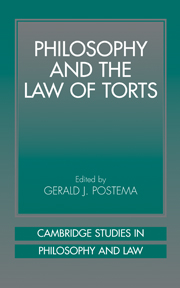Book contents
- Frontmatter
- Contents
- Contributors
- 1 Introduction: Search for an Explanatory Theory of Torts
- 2 A Social Contract Conception of the Tort Law of Accidents
- 3 Responsibility for Outcomes, Risk, and the Law of Torts
- 4 The Significance of Doing and Suffering
- 5 Tort Law and Tort Theory: Preliminary Reflections on Method
- 6 Corrective Justice in an Age of Mass Torts
- 7 Economics, Moral Philosophy, and the Positive Analysis of Tort Law
- 8 Pluralism in Tort and Accident Law: Towards a Reasonable Accommodation
- References
- Index
8 - Pluralism in Tort and Accident Law: Towards a Reasonable Accommodation
Published online by Cambridge University Press: 01 July 2009
- Frontmatter
- Contents
- Contributors
- 1 Introduction: Search for an Explanatory Theory of Torts
- 2 A Social Contract Conception of the Tort Law of Accidents
- 3 Responsibility for Outcomes, Risk, and the Law of Torts
- 4 The Significance of Doing and Suffering
- 5 Tort Law and Tort Theory: Preliminary Reflections on Method
- 6 Corrective Justice in an Age of Mass Torts
- 7 Economics, Moral Philosophy, and the Positive Analysis of Tort Law
- 8 Pluralism in Tort and Accident Law: Towards a Reasonable Accommodation
- References
- Index
Summary
Introduction
When we make choices, even such everyday choices as how to spend an evening (or what restaurant to choose beforehand, or what mode of transport to use in getting there), we are typically confronted with a plurality of different criteria informing the choice. In choosing, for example, between spending the evening at the movies or at a philosophy lecture, we might have to consider whether on this particular evening we wish to be pleasurably entertained or intellectually challenged. There might also be good reason for considering cost, convenience of parking, and the amount of time involved. Moreover, these various criteria seem to flow from quite different and independent sorts of values. It seems hard to believe that the purely hedonic pleasure involved in watching some action film is really an aspect of a larger philosophical understanding, or that the understanding offered by the philosophy lecture, although pleasurable, is the same kind of pleasure as that offered by the movie. Indeed, it seems likely that the last three considerations mentioned (cost, convenience, time), which are of a more practical nature, will be as much informed by how we might otherwise spend our time and money, that is, by the broad range of very different forms of experience that could be enjoyed beyond the two options mentioned here, and thus that they implicate an even more diverse array of criteria and values than pleasure and understanding.
Plurality, then, is the rule rather than the exception when we make choices.
- Type
- Chapter
- Information
- Philosophy and the Law of Torts , pp. 276 - 322Publisher: Cambridge University PressPrint publication year: 2001
- 1
- Cited by

